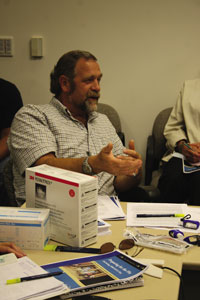Preventing the flu

This archived article was written by: Jessa Love Adams
Each year in the United States more than 200,000 people are hospitalized from the regular flu. Almost 36,000 people die from flu complications according to Center for Disease Control (CDC). This flu season is expected to be worse, plus there is a different flu virus spreading quickly called Novel or new H1N1 flu. On September 1 a campus wide meeting was held, where strategies were planned for CEU was discussed. According to CDC, this virus may cause more severe illness than usual. This flu brings up a lot of important questions, like what are the flu and the flu symptoms? What are the concerns of the flu? How do people prevent getting the flu? What should someone do if he/she gets the flu? How do we get the word out there?
New H1N1, aka the swine flu, is a new virus. The virus was found in Americans in April 2009. A lot like the regular flu, it spreads quickly from person to person. Symptoms are a fever 100 degrees Fahrenheit or higher, chills, sore throat, runny nose, headache, tiredness, diarrhea, or vomiting. To reduce the high fever, take medicines that have acetaminophen; like Tylenol, Ibuprofen, or Motrin writes the CDC.
The biggest concern is spreading the flu. The highest number of 2009 H1N1 cases have been among people ages 5-24 years old. The majorities of people who attend CEU are in that age group, and are all in contact with each other during class, in the dorms and at lunch. We share bathrooms and desks, so when one of us gets it, it’s not if the rest of us get it, but when the rest of us get it, reported Dave Cunningham, Health Officer for South Eastern Utah.
There’s a lot you can do to prevent getting the flu. The first thing you can do is get vaccinated-the flu shot. It will protect you from getting the more common flus. Getting vaccinated is especially important for those in the high risk category which is young children, pregnant women, people with asthma, diabetes, heart or lung diseases, or are 65 and older. There is not a vaccination for H1N1, it is still being produced and will be available in the coming months, reports the CDC literature. Be cautious of germs. Cough and sneeze in your shirt or in a tissue. Wash your heads and keep them sanitized. Do NOT touch your face, avoid close contact with others, and sanitize your car, bedroom, bathroom, cell phone, computer, and iPod/mp3 player.
If you do get the flu you should Isolate yourself for at least 24 hours, let your fever go down, and limit contact with others. If you are living on campus go home, and if you can’t go home stay in a room by yourself. Take antiviral drugs, they work best when taken the first two days when symptoms arise. If your roommate gets the sickness limit as much contact with them as you can, stay at least six feet apart from him/her. Clean as often as you can to prevent germs from spreading.
This flu is serious, and everyone needs to be aware of it and be prepared for it. You can get the word out there. Send out forwards via email or text about how serious the flu is and encourage good hygiene to your friends, family, and coworkers. Make flyers and posters about the flu and hang them up around campus, work or dorm. For more information about the flu go to www.cdc.gov, www.flu.gov, or talk to your health care provider.




